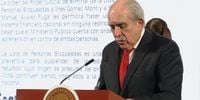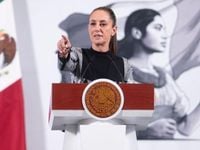In a significant development in the ongoing saga of Inés Gómez Mont and her husband, Víctor Manuel Álvarez Puga, the head of Mexico's Financial Intelligence Unit (UIF), Pablo Gómez, confirmed during a press conference on April 1, 2025, that the couple has been removed from the List of Blocked Persons. This decision follows a judicial ruling that allows them to access the national financial system despite facing serious criminal charges, including organized crime and money laundering.
Gómez revealed that the couple, who have been fugitives since 2021, are currently residing in the United States, effectively evading extradition to Mexico. He expressed hope that they would soon be extradited to face justice for their alleged crimes, which include embezzlement and operations with illicit funds amounting to three billion pesos (approximately 150 million dollars). “They have been able to evade extradition from the United States to Mexico,” Gómez stated, emphasizing the urgency of the situation.
The controversy surrounding Gómez Mont and Álvarez Puga intensified after a federal judge ordered the unblocking of their financial accounts, allowing them to operate freely within the financial system. This decision has drawn sharp criticism from both Gómez and President Claudia Sheinbaum, who accused the Judiciary of collusion and corruption. Sheinbaum remarked, “When it is demonstrated that there is money laundering, whether through corruption or white-collar crime, and the accounts are released to continue using the resources, it has no other name but corruption.”
On March 4, 2025, the UIF complied with the judicial order to restore the couple's financial services, which was initially granted by a district judge in November 2023. This ruling was confirmed by the Third Collegiate Court in Administrative Matters of the First Circuit, which allowed the couple to be removed from the List of Blocked Persons. Despite this, both individuals still face outstanding arrest warrants from the Public Ministry.
In her remarks, Sheinbaum highlighted the need for legal reforms to prevent judges from granting suspensions that lead to the unblocking of accounts linked to serious criminal activities. She stated that changes to the Amparo Law are being prepared to ensure that judicial decisions do not undermine efforts to combat corruption and money laundering. “We are preparing reforms to prevent judges from granting suspensions to unfreeze bank accounts linked to money laundering,” she said.
Gómez Mont and Álvarez Puga's legal troubles stem from accusations of fraud and money laundering, particularly involving fraudulent contracts with the Mexican government. Investigations revealed that they allegedly diverted over three billion pesos through shell companies, which facilitated tax evasion and the laundering of illicit funds. The couple's activities reportedly included a series of false projects within the federal penitentiary system, where they profited significantly before fleeing to the United States.
Since 2021, the couple has been the subject of a red notice issued by Interpol at the request of the Mexican authorities, aimed at locating and arresting them across more than 190 countries. Despite these efforts, they have managed to evade capture and continue to operate with impunity.
During the press conference, Gómez also criticized the Judiciary for its role in the unblocking of the couple's accounts. He claimed that federal judges have systematically granted amparos to individuals being investigated for money laundering, effectively undermining the financial intelligence system in Mexico. “The Judiciary has become the most militantly opposed element to the development of Mexico's financial intelligence system,” he asserted.
Gómez's statements reflect a growing frustration with the judicial system's handling of cases involving high-profile individuals accused of serious crimes. He mentioned that from December 2018 to March 2025, the UIF had blocked a total of 32 billion pesos, but a significant portion of these funds were unblocked following judicial orders. “The situation is so dire that many people perceive that judicial reform is essential,” he noted.
Sheinbaum's administration is now pushing for changes to the legal framework governing the Judiciary, particularly in light of the upcoming elections for judicial positions scheduled for June 1, 2025. The president emphasized the importance of addressing the perceived corruption within the Judiciary, stating, “This collusion and corruption of judges cannot continue.”
As the case of Inés Gómez Mont and Víctor Manuel Álvarez Puga unfolds, it highlights broader issues of corruption, accountability, and the effectiveness of Mexico's legal system in addressing financial crimes. The government's commitment to reforming the Judiciary may play a crucial role in restoring public trust and ensuring that justice is served in cases involving high-profile fugitives.









